Are 20 years of democracy equal to 200?
Adelina Marini, January 10, 2011
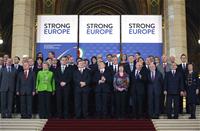 Freedom of speech and media freedom might seem one and the same thing and to look alike but this is not exactly true. Media freedom, aside from everything else, also means responsibility in terms of the consequences a publication might cause in society. This is exactly why media are a subject of regulation so that they could be subordinated to certain norms and values. Like everything that either has to be regulated or has to be safeguarded from over-regulation and from being blocked, even best examples in the developed countries around the world demonstrate weakness when the society itself does not dictate the terms.
Freedom of speech and media freedom might seem one and the same thing and to look alike but this is not exactly true. Media freedom, aside from everything else, also means responsibility in terms of the consequences a publication might cause in society. This is exactly why media are a subject of regulation so that they could be subordinated to certain norms and values. Like everything that either has to be regulated or has to be safeguarded from over-regulation and from being blocked, even best examples in the developed countries around the world demonstrate weakness when the society itself does not dictate the terms.
Media freedom and democracy go hand in hand - the former cannot exist without the latter and vice versa. This is why it is odd when a mature man and an experienced politician states that we should respect a 20-year old democracy the same way as a 200-year old democracy. These words belong to the Hungarian PM, Viktor Orban, uttered on Friday (January 7th) during his joint press conference with European Commission President Jose Manuel Barroso on the occasion of the official taking of the Presidency of the EU.
This media event was very interesting for several reasons. The first was that both speakers devoted a lot of time to Hungarian Presidency's priorities, as well as to the main challenges the EU was facing. Not that this is not important but on the sixth day of the presidency these priorities are well known to everyone.
The second thing that impressed a lot was that Mr Orban undertook a 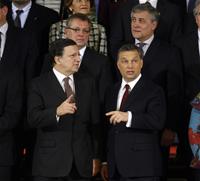 preemptive move by talking yet before the Q&A session about the problems Hungary created with its new media legislation. According to him, Hungary was a subject of sharp criticism because of the media legislation. The reactions were very emotional, strong and multifaceted. The government was following these reactions and this was why the European Commission committed to review carefully the package and if there was even one single article in it that was in contradiction to the European requirements or the legislation of the rest of the EU member states, the law would be repealed, Viktor Orban assured.
preemptive move by talking yet before the Q&A session about the problems Hungary created with its new media legislation. According to him, Hungary was a subject of sharp criticism because of the media legislation. The reactions were very emotional, strong and multifaceted. The government was following these reactions and this was why the European Commission committed to review carefully the package and if there was even one single article in it that was in contradiction to the European requirements or the legislation of the rest of the EU member states, the law would be repealed, Viktor Orban assured.
However, he asked the legal experts of the Commission to assess the legislation with the same criteria they would apply to other member states. The Hungarian prime minister insisted very much on emphasizing that this problem should not overshadow the presidency, the success of which is necessary for Europe at large, not only for Hungary.
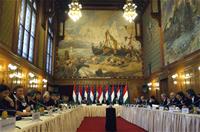 And the third thing that impressed me as a journalist was that "because of the tough schedule" there was a possibility for only four questions - two for the Hungarian media and two - for foreign journalists. I myself always get angry with such restrictions, especially during important events because, after all, when there are a lot of questions it is hard for them to be coordinated and compressed into 2, 3 or 4 questions. Each medium has its own interests but after all it is the society that loses from scant information. Furthermore, Hungary is taking over the presidency over the Council of the EU and in Brussels there is no such practice of limiting the questions - even in midnight briefings, after exhausting European Councils, the journalists have the opportunity to freely ask their questions to European leaders.
And the third thing that impressed me as a journalist was that "because of the tough schedule" there was a possibility for only four questions - two for the Hungarian media and two - for foreign journalists. I myself always get angry with such restrictions, especially during important events because, after all, when there are a lot of questions it is hard for them to be coordinated and compressed into 2, 3 or 4 questions. Each medium has its own interests but after all it is the society that loses from scant information. Furthermore, Hungary is taking over the presidency over the Council of the EU and in Brussels there is no such practice of limiting the questions - even in midnight briefings, after exhausting European Councils, the journalists have the opportunity to freely ask their questions to European leaders.
In his introductory remarks the president of the European Commission, Jose 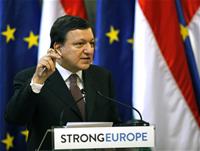 Manuel Barroso said that the principle of freedom of press was sacred in the European Union. He added that he had received Hungarian PM's assurances that the law had been written with full respect of the European values. The Commission would make a legal assessment, Barroso said and added that in the Commission the law was read but had not been received officially. Besides, it was on January 5th when the full translation of the 200-page document had been received, for which some media claimed it was not full and precise. This issue, however, was not raised neither by the Hungarian, or by the foreign media.
Manuel Barroso said that the principle of freedom of press was sacred in the European Union. He added that he had received Hungarian PM's assurances that the law had been written with full respect of the European values. The Commission would make a legal assessment, Barroso said and added that in the Commission the law was read but had not been received officially. Besides, it was on January 5th when the full translation of the 200-page document had been received, for which some media claimed it was not full and precise. This issue, however, was not raised neither by the Hungarian, or by the foreign media.
Quite expectedly the first question was asked by the BBC and was related precisely to the media legislation. Viktor Orban said that the Hungarian media authorities were not bigger in range as similar ones in other EU countries, probably having in mind the new body - Media Council - which has begun work in the beginning of the year. "If we study the relevant laws in Europe and if we find out that there is an excessive concentration compared to other member states, we will amend the law", Orban said and added:
"It is very important and during my talks with Barroso I made it clear that, of course, we cannot accept a way of thinking that would cast doubts over Hungary and its democratic commitments, only because our democracy is 20 years old and not 200. This is discrimination. We are a country that shed a lot of blood for freedom; which sacrificed a lot of lives for democracy. We are a European country which fought against the totalitarian regime and we were ready to fight. Hungarian democracy must receive the same respect in Europe as the rest".
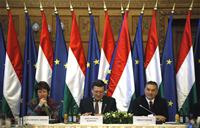 The second question of foreign media, asked on behalf of the French newspaper Le Monde, was again related to media freedom on Hungary. It is also interesting what were the Hungarian media interested in. Both questions which were given to Hungarian TV stations, were related to Hungary's tax policy and the EU. In the first case the question was about the corporate tax which the new centre-right government led by Orban had introduced on foreign corporations, which then complained in the Commission. According to Orban, this issue is yet to be debated but:
The second question of foreign media, asked on behalf of the French newspaper Le Monde, was again related to media freedom on Hungary. It is also interesting what were the Hungarian media interested in. Both questions which were given to Hungarian TV stations, were related to Hungary's tax policy and the EU. In the first case the question was about the corporate tax which the new centre-right government led by Orban had introduced on foreign corporations, which then complained in the Commission. According to Orban, this issue is yet to be debated but:
"Hungary is a poor country. The average salary hardly reaches 600 euros per month. More than 3mn Hungarians (out of almost 10mn population) live under the poverty line. The average pension is around 300 euros. So, I have to reduce the debt, to control the deficit and to make the country competitive. This is why we need the contribution, the participation of foreign companies for a transitional period of 3 years". On this issue Barroso said that he expected the official position of the Hungarian authorities on the questions the Commission had sent after receiving complaints from foreign companies. In conclusion, however, he stated his firm belief and confidence in the Hungarian rule of law, the democratic foundations of the country and its capability to tackle successfully with its first presidency.
Whether this is so is yet to become clear by the end of the month, when it is expected the Foreign Affairs Council to declare its position on the Hungarian media law. By then it is expected the Commission to have ended the review of the legislation. In any case, however, as much as the Hungarian prime minister does not want to, he has already entered the spotlight. The question is how is he going to leave it. It is also important how the EU would handle this consequent unpleasant situation.